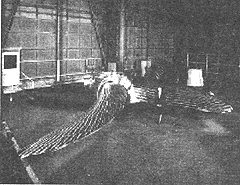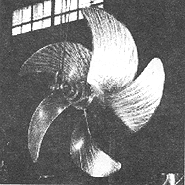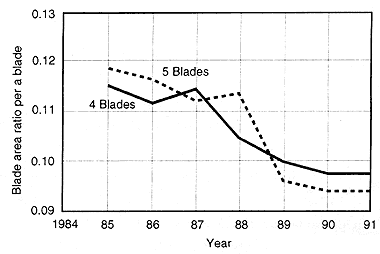Our most advanced propeller designing system has so far produced two types of high-performance propellers. They are high-performance propeller with smaller blade area ratio (PAI propeller) (Photograph 3), and highly skewed propeller for the main purpose of reducing propeller exciting force for lower vibration with lower noise (Photograph 4). The introduction of the superior performance by these propellers is made below.

Photo.3 PAI propeller

Photo.4 Highly skewed propeller
3. HIGH-EFFICIENCY PROPELLER ("PAI" PROPELLER)
It is a well known fact that the reduction of load per unit square on propeller with the propeller diameter being enlarged will be an effective method for increasing the propeller efficiency; which is so-called slow-rotating large-diameter propeller. In the wake of such slow-rotating large-diameter propellers being popularly adopted, propeller's blade area ratios have been reduced gradually. The reduced blade area ratios in expectation for the improvement of efficiency, on the other hand, has regretfully caused an unexpected problem.

Fig. 3 Recent transition of the propeller blade area ratio
Figure 3 shows the recent transition of the propeller blade area ratio. The blade area ratio is per one blade. As you see from the figure, the ratio has abruptly been reduced during these 7 years only; and especially during these several years the ratio has been reduced even below as narrow as 0.1.
BACK CONTENTS NEXT